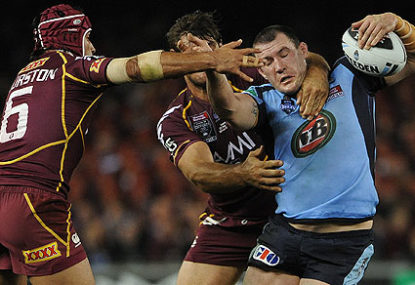NRL Round 7 judiciary: Roosters star duo charged, Eels forward in strife again
James Tedesco will be free for the next game of the Sydney Roosters' inconsistent NRL campaign after escaping suspension for tripping Ryan Papenhuyzen. The…

Banning the biff has been like a wet cement sign to a toddler. That cement has had several fists imprinted into it since the order came down from on high that punching another human in the head was perhaps a tad barbaric.
It’s almost as if being told not to do it made it impossible to resist.
Parramatta’s Mitchell Allgood is the latest to test the resolve of the powers that be at Rugby League Central.
The Eels prop has been hit with a grade three striking charge after lashing out at Manly centre Steve Matai on Monday night at Brookvale Oval.
He’ll get two matches if he takes the early guilty plea and three if he fights the charge and loses at the judiciary.
The penalty could’ve been harsher, but the swinging arm that preceded the punch actually hit his own player. The match review committee couldn’t really charge him with friendly fire.
Grading a punch is an interesting concept.
It opens up the possibility that one punch is better or worse than another.
But isn’t the intention of every flying first the same?
The match review committee should consider separating punches from the ‘striking’ category and with it lose the ability to grade them.
A punch is a punch and every strike deserves the same punishment. The only thing that wouldn’t fit would be king-hits.
An instant sin-bin obviously isn’t proving to be a big enough deterrent.
There has been a long and loud outcry against the crackdown on the biff. How could administrators possibly limit a player’s ability to belt an opponent in the head? The game has gone mad!
No… no it hasn’t.
To say banning the biff is ruining the game is to sell the code extremely short.
It earned a billion dollar television deal because it is the perfect mix of toughness and finesse.
Rugby league is built on legal, yet brutal tackles and hit-ups, the amazing skills of players like Andrew Johns and Johnathan Thurston and the acrobatics of wingers who wouldn’t look out of place on a circus high-wire.
Do people really watch the game to see two players throw wild haymakers?
On most occasions the punches have been in retaliation to what we’re told is niggle from the opposition.
You can only referee against that to a certain extent.
The whistleblowers have played their part for not taking stronger action before situations escalate, but punches are the wrong response to a situation.
The inevitable sin-bin costs the team during a game and in the weeks that follow.
There is no upside to throwing one.